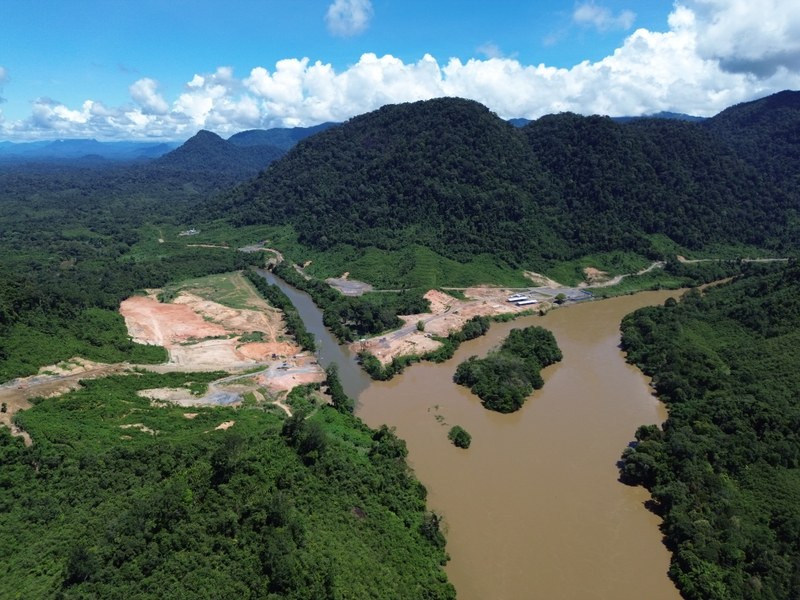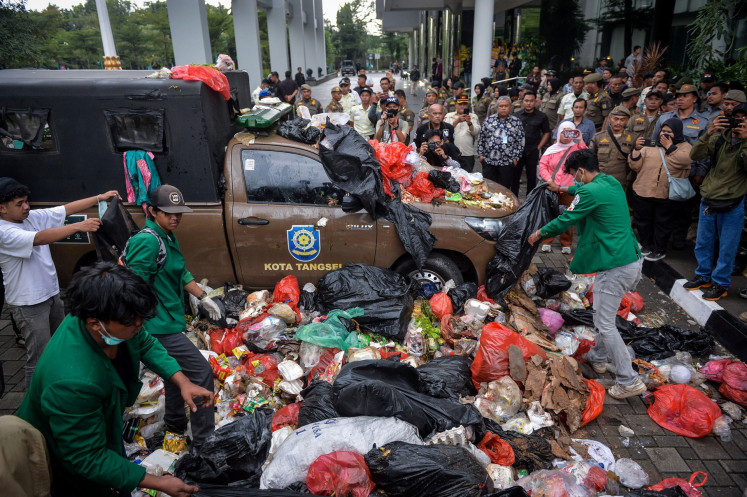Popular Reads
Top Results
Can't find what you're looking for?
View all search resultsPopular Reads
Top Results
Can't find what you're looking for?
View all search resultsHow bold climate action can help Indonesia achieve growth target
Indonesia has already made impressive strides in climate adaptation, and with its abundant resources and historic leadership, this year presents a critical opportunity for it to take another big step forward in paving the way to both global and national prosperity, by embracing the global clean energy boom and leading climate finance.
Change text size
Gift Premium Articles
to Anyone

As Indonesia strives toward its goal of 8 percent annual economic growth, there is a powerful force it can harness to drive prosperity, increase resilience, protect nature and improve the living standards of its people: bold action on climate change.
Last year, the global clean energy boom hit US$2 trillion, twice as much as was invested in fossil fuels, according to the International Energy Agency. Right now, there is a prime opportunity for Indonesia to secure a bigger share of this huge global boom, as well as its vast benefits for the Indonesian people. Nations and economies taking the strongest climate actions are already seizing the biggest share.
This year, all countries are putting together new and strengthened national climate plans under the Paris Agreement, or Nationally Determined Contributions (NDCs). A strong new plan is the pathway to a stronger economy, reduced fossil fuel pollution and a healthier, wealthier population.
With abundant natural resources essential to the clean energy boom, Indonesia has advantages that are enjoyed by few other countries; whether it's nickel processing or working to ramp up production of electric vehicle batteries.
On top of this, President Prabowo Subianto’s plan to retire all coal and other fossil fuel power plants while dramatically building out clean energy is exactly the kind of leadership that will drive change.
Embedding these ideas and policies into a national climate plan will cement Indonesia as a regional and global leader, and light the path for others to follow. Clear policy signals, maintained and strengthened over time, will also attract more foreign investment in key sectors that will drive economic growth.
An ambitious new climate plan will also help to bolster Indonesia’s influence in other global and regional intergovernmental forums.
As a Group of 20 nation, Indonesia has a critical role in global climate cooperation through BRICS and ASEAN. For example, it played a major role in reforms to the global finance system that are unlocking finance for all countries to invest in their transitions, especially developing countries. Its leadership history goes back even further: Under president Susilo Bambang Yudhoyono, Indonesia was the first developing country to pledge to cut its emissions.
As the clean energy boom continues to grow, we’re seeing a global race to the top as companies and countries compete for opportunities and investment. If Indonesia sets strong climate plans this year and implements existing pledges, this growing boom will create vast new markets for its products and new opportunities for trade, helping to achieve the government’s economic growth targets.
Other G20 economies, including Brazil and the United Kingdom, have already announced targets and plan to take stronger climate action across their societies. They know the global clean energy transition is unstoppable, and that stronger climate action will secure more economic growth, jobs for their workers and profits for their businesses.
These plans, and the Paris Agreement, are delivering real progress. Without them, the world would be headed toward 5 degrees Celsius of global heating, which most of humanity would not survive. Based on the current pledges of all countries, we are still on course for around 3 degrees, which would still cause catastrophic damage to every economy and its people. No country will be immune.
That’s why action to increase resilience is so important, too. Indonesia is the world’s largest archipelagic state, and sea level rise directly threatens more than half its population that live in coastal communities, from the smallest villages to Jakarta itself.
I’m impressed by the efforts that have already been made to adapt, including strengthening early warning systems for climate-related diseases and disasters. Now, it’s time to double down on climate adaptation: Doing so will avoid economic shocks.
Indonesia’s living forests, are home to an astonishing variety of life and beauty, are an incredible asset. They are also critical for absorbing carbon and sustaining rural livelihoods, as they help safeguard water resources, prevent natural disasters and maintain the ecological balance that underpins Indonesia's economy and culture.
Protecting forests will be a major focus of this year’s global climate talks in Belem, Brazil, providing another opportunity for Indonesia to lead the world.
In this race to the top to realize the benefits of climate action, no country can afford to be left behind. That’s why it is so essential Indonesia puts together the strongest climate plan possible, putting the country on a pathway to incredible prosperity.
***
The writer is executive secretary of the United Nations Framework Convention on Climate Change (UNFCCC).











